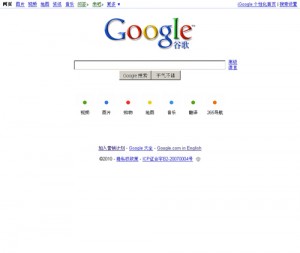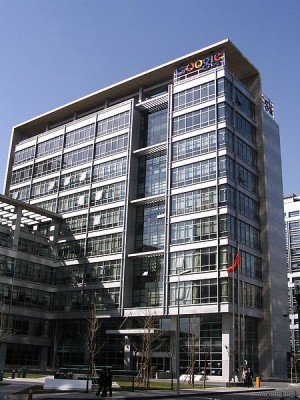
In a controversial move on Tuesday, January 12, Google threatened to pull its services out of China, citing a cyber attack aimed at the Gmail accounts of human rights activists. Then, in an announcement just eight days later, malware computer specialist Joseph Stewart of SecureWorks, an Atlanta based computer security firm, found obvious patterns in the code that may point to the Chinese government.
While experts are cautious to directly point an e-finger of accusation at the Chinese government, it is hard to turn a blind eye to a past riddled with tight regulation and censorship when determining the ultimate perpetrator.
Yu-Ting Saw, a junior in the Sargent College of Health and Rehabilitation Sciences, never trusted Google when she attended an international school in China.
“I used to think Google was the worst search engine because it would not work,” said Yu-Ting. “When I was a kid and Googling and something didn’t appear, we would just accept it, and not even think it was the government.”
Yu-Ting’s disillusionment with the American search engine disappeared with the realization of the cause behind the “Cannot Display” pages that plagued her eighth grade biology research project: “I realized it was the government censoring.”
Several years later, Google is taking a stand.
The Life of an American Business in China
To successfully operate a business in China, a company has to obey a certain set of rules that are particularly foreign to Americans, not because of the language in which they are communicated, but instead because of the constitutional rights that they might compromise. The First Amendment right to free speech, for example, does not necessarily apply to the multinational search engine that’s operating on the other side of the planet.
“As a condition to doing business in China, companies have to adhere to certain regulations,” which includes censoring certain information on the internet, according to Senior Lecturer in the School of Management David Randall.
Yet in 2006, this American firm, who preaches the motto of “don’t be evil,” found itself on the other side of the Great Firewall of China.

“I was surprised that Google did this,” said Randall. “This didn’t seem like it was enough for Google to pull out.”
American companies, including direct competitors like Yahoo!, have adhered to censoring regulations in China primarily because doing so allows the company to reap great profits in this especially lucrative market. For a global business to position itself in the world market, it must generate profits in China’s economic stronghold.
It’s an economic hold that, according to Professor Randall, has close ties to the government.
“The Chinese government is very actively involved in economic and industrial policies,” stated Randall. “They have a very interesting relationship with the internet, and that is reflected in the economy.”
So why now? Why Google?
Maybe it was the straw that broke the camel’s back, or maybe Google realized it was losing a futile battle of advertising spending to its Chinese counterpart baidu.com.
A Strategic Business Move or a Strong Stance Against Censoring?
In the increasingly competitive world of internet search engines, companies generate their revenue through ad spending. In the United States, Google has been and will probably continue to be the leader in search engines due to its large market share, product quality and superior consumer-based awareness levels.
However, Google does not enjoy this same success in its international markets–particularly in China.
Baidu.com, known as the “Chinese Google” according to Yu-Ting, dominates the market in China and its share is only growing, according to a Wall Street Journal “Market Watch” report.
U.S. relations with China are complicated to say the least. However, maintaining a positive relationship with the country allows the United States to maintain both an ally and one of the largest investors in our economy. The last thing you want to do in a recession is upset one of your biggest investors.
Ever since the tire debacle from early September 2009 when President Obama imposed a three-year tariff on Chinese tires, we’ve been treading lightly (pun intended) on economic relations with China.
Nevertheless, “this is not a big enough issue to sell off U.S. assets,” according to Randall, who continued to voice the importance of positive economic and foreign relations with this rising economy.
But if you want to play in the big leagues, you have to abide by their rules, which, like it or not, includes censoring online content.
“China’s role in the world economy is becoming more important,” stated Randall, “and it’s going to be harder for any company to ignore China.”
Yong Kai Saw, a recent 18-year-old member of the Singapore military and brother to Yu-Ting, cites “political and civil unrest in China” as the primary reasons for censorship in this country.
After living in China for over five years, Yong, who has considered living in China in the future, has experienced Chinese censoring first hand.
“The Chinese government does not want negative information to spread throughout China and to the rest of the world,” said Yong. “They want to curb internal tensions while maintaining a reputable exterior standing.”
If Google actually pulls out of China, are they taking a humanitarian stand against censoring, or are they covering up a failed business strategy in a market where the barrier to entry is blocked by government regulations?
My guess, a little of both.

Very informative article! Great job!
Mr. Stewart’s “China code” claim seems to have some problem:
1) A follow-up published by The Reister on 1/26 contradicted the claim the CRC algorithm was not known outside China. The 4-bit CRC code has been around for over a decade in the device application arena. Once this fact is public, several code samples outside China have been located by bloggers discussing this issue.
2) Mr. Stewart seems to have neglected the fact variable names are stripped out during code compilation when he alluded to a variable name in the Aurora machine code. There is absolutely no link between the “crc_ta[16]” variable he identified as Chinese, and the machine code in Aurora.
3) Upon closer examination of Mr. Stewart’s citations, the alleged Chinese white paper containing the algorithm, and code snip found by Googling the identified variable name, both turned up different code than what’s in Aurora.
Specifically, the Aurora code contains a 12-bit shift optimization (found as early as 1988 according to The Register article):
t = crc16 >> 12
however the code passed around in Chinese sites is unoptimized code using two divisions:
da=((uchar)(crc/256))/16